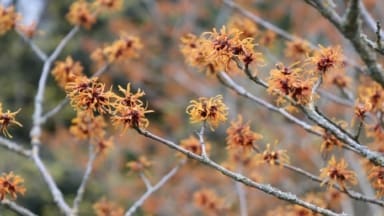
Collections of Hamamelis (witch hazel), Amelanchier and Eucalyptus held at the National Memorial Arboretum and Ventnor Botanic Gardens, have gained National Plant Collection status ahead of National Tree Week 2024 celebrations.
The collections of witch hazel and Amelanchier are held at the National Memorial Arboretum in Staffordshire and a scientifically significant collection of Eucalyptus trees is held at Ventnor Botanic Gardens on the Isle of Wight. All three collections, comprising of 434 trees, are now protected for the future and will continue their vital role in helping mitigate against the challenges of climate change and encouraging wider biodiversity at both sites.
The National Memorial Arboretum is home to approximately 25,000 trees, including 262 witch hazel and 102 Amelanchier. The arboretum has worked exclusively with Collection Holder and expert Chris Lane, who has propagated his own collections in Kent to supply the arboretum with duplicates of both varieties. This not only increases the numbers of both trees but also acts as a crucial back-up to further protect both varieties, should anything ever happen to the collections. This forward planning is key to the longevity of different tree and plant collections and is widely encouraged by Plant Heritage as part of the charity’s ongoing conservation work. These collections can be seen in the arboretum, where they stand alongside more than 420 memorials to members of the Armed Forces, Emergency Services, and civilian services, including the iconic Armed Forces Memorial.
Further south, Ventnor Botanic Garden’s newly accredited Eucalyptus collection is part of nationally important trial designed in the 1970s to test the limits of existing trees’ hardiness and introduce new species to the site. The outcomes from this trial will increase current understanding about how climate change is affecting various trees and plants, and how gardens might respond in the future. Consequently, most of Ventnor’s Eucalyptus trees are now regarded as county or national champions on the Tree Register, as a mark of their responsiveness to a warming climate and their significance as indicators of change.
Gwen Hines, CEO of Plant Heritage, said: “Both the National Memorial Arboretum and Ventnor Botanic Gardens are sites of historical and national importance, meaning all three collections will be available for everyone to visit, in all seasons, in perpetuity. Also, the fact that both sites will always have a dedicated team caring for these special trees is fundamental, as this will ensure their long-term survival. Knowing that the future of these collections is now secured is a real triumph for our ongoing plant conservation work.”
The UK is now home to over 700 National Plant Collections, from winter flowering Cyclamen and holly synonymous with Christmas, to early spring bulbs waiting to escape winter’s grasp. These collections contain a over 95,000 plants and together are crucial for encouraging biodiversity to thrive, as well as helping us adapt to and mitigate against the challenges of climate change. These ‘living libraries’ are cared for by passionate individuals either at home, in the garden, greenhouse or nearby allotment, or by nurseries, garden centres, and larger organisations including arboretums, botanic gardens and historic houses. Collections can be found in unexpected places too, such as a pub garden, a women’s prison, and zoos.
Founded in 1978, Plant Heritage is a cultivated plant conservation charity, for plants that have been collected, bred or grown in UK gardens. The charity aims to conserve and safeguard the UK’s horticultural heritage and diversity of garden plants by keeping living examples of rare plants in the National Plant Collections scheme, or with Plant Guardians – who grow and nurture one or more rare and unusual plants in their own garden or house. To start a National Plant collection, see a collection, or for more information on the charity’s conservation work, visit the Plant Heritage.

